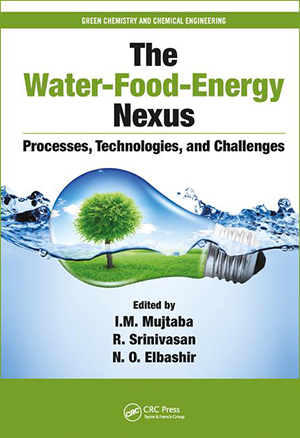
Professor Nimir O. Elbashir, the director of the Texas A&M Engineering Experiment Station (TEES) Gas and Fuels Research Center (GFRC), a professor at Texas A&M University at Qatar (TAMUQ), and the director of the TAMUQ Fuel Characterization Lab, is a co-editor of a new book “The Water-Food-Energy Nexus: Processes, Technologies, and Challenges” published by CRC Press.

Authored by Elbashir in collaboration with Professor Iqbal Mujtaba from Bradford University and Professor Rajagopalan Srinivasan from the Indian Institute of Technology Gandhinagar, this book is the result of two workshops funded by the British Council. One of the workshops, which focused on energy and water, was held in Qatar and was organized and co-sponsored by the TEES GFRC. A second workshop focused on water and food was held in India.
Publisher’s Website: The Water-Food-Energy Nexus: Processes, Technologies, and Challenges
Publisher’s Description:
The exponential growth of the worldwide population requires increasing amounts of water, food, and energy. However, as the quantity of available fresh water and energy sources directly affecting the cost of food production and transportation diminishes, technological solutions are necessary to secure sustainable supplies. In direct response to this reality, this book focuses on the water-energy-food nexus and describes in depth the challenges and processes involved in efficient water and energy production and management, wastewater treatment, and impact upon food and essential commodities. The book is organized into 4 sections on water, food, energy, and the future of sustainability, highlighting the interplay among these topics. The first section emphasizes water desalination, water management, and wastewater treatment. The second section discusses cereal processing, sustainable food security, bioenergy in food production, water and energy consumption in food processing, and mathematical modeling for food undergoing phase changes. The third section discusses fossil fuels, biofuels, synthetic fuels, renewable energy, and carbon capture. Finally, the book concludes with a discussion of the future of sustainability, including coverage of the role of molecular thermodynamics in developing processes and products, green engineering in process systems, petrochemical water splitting, petrochemical approaches to solar hydrogen generation, design and operation strategy of energy-efficient processes, and the sustainability of process, supply chain, and enterprise.
About the TEES Gas and Fuels Research Center
The GFRC is a multidisciplinary research center that is led by Texas A&M University at Qatar and involves 22 professors from the Qatar campus and Texas A&M University’s main campus in College Station. The center draws on experience from different engineering programs including chemical engineering, petroleum engineering, material engineering and mechanical engineering.
